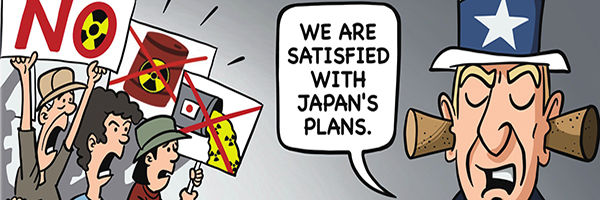Why the US and West are so keen to act as ‘victims’: Global Times editorial
 Global Times, September 2, 2023 —
Global Times, September 2, 2023 —
While on a visit to the Fukushima region on Thursday, US Ambassador to Japan Rahm Emanuel said that he expected the US to support Japan should China’s ban on Japanese seafood develop into a dispute at the WTO. He even labeled China’s just act of protecting the health of consumers as “economic coercion against Japan.” To put it bluntly, he believes China is “bullying” Japan using economic means. He failed to mention that the cause was Japan forcefully dumping nuclear-contaminated wastewater into the sea and polluting the marine ecological environment, and instead portrayed Japan as a victim.
This scene is telling. Regarding the issue of dumping nuclear-contaminated wastewater into the sea, Japan is clearly the offender, and China is one of those being threatened. But in the narrative of the US and the West, why have the perpetrators become victims and gained international sympathy? Emanuel confusing the cause and effect and making unfounded countercharges is the classic playbook of the US and of the West playing the victim. In recent years, Western countries, which have been acting arrogantly as “great powers,” are now full of victims’ grievances and complaining about being “coerced” and “bullied,” which seems peculiar.
Whether it is economic, military or political, the advantages held by the US-led Western bloc are obvious. Although this advantage fluctuates from time to time, it has generally been maintained since the end of World War II until now. In other words, they are bigger in every field. They only bully others, and they do love to bully others. This has become the main manifestation of the hegemony of the US and the West. Over the years, there have been numerous examples of their interference, bullying, coercion and even direct aggression against other sovereign countries. Now, they frequently come out with complaints and accusations of being “bullied” by others. This serves as a big contrast to the true impression left on the world by the reality of international politics.
In the West, this is known as “victim-blaming.” When the US and the West claim that they have been bullied and harmed, it is not because they have actually suffered any injustice, but because they have evil intentions.
On the one hand, for the US and the West, the “victim-blaming” approach is also a form of cognitive warfare. A classic example of this unfolded at the Shangri-La Dialogue in early June this year, where US Secretary of Defense Lloyd Austin, in his speech, mentioned “bullying” three times and “coercion” five times, all pointing to China, either directly or indirectly, conveniently forgetting the fact that it is the US aircraft carriers and military aircraft that continually provoke China in its vicinity. Their robber’s logic is evident. When it comes to smearing and demonizing China, the standard of the Western world can change as easily as a swiveling wheel, depending on their interests. Being devoid of logic is their own logic, being devoid of reason is their reason, and being devoid of rules are their rules.
On the other hand, the so-called “victim” mentality of the US and the West is also a form of resistance against the prevailing trends of the times. In a sense, the anxiety felt by Western countries may not be entirely staged. Following the victory in the Cold War and for a considerable period after its conclusion, developed countries enjoyed unrivalled dominance in shaping international discourse. As a result, many Western elites naturally believed that international rules should be tailor-made to serve their own interests, unquestionably granting them the right to prioritize their own development. However, as history’s pendulum has swung toward a multipolar world, the international order, which was previously dominated by the US, is inevitably undergoing changes. So, on the surface, it may seem like they are rejecting China’s gradual ascent to the global center stage, but deep down, they are filled with fear about turning the page on history and entering a new era.
Previously, Washington arrogantly claimed that it would deal with China from “a position of strength.” Later, they changed their tune, saying they would not back down in the face of China’s “bullying and coercion.” This shift occurred because they gradually realized that their efforts to suppress China were not gaining international support and were unlikely to succeed. Therefore, they are changing their rhetoric to package themselves differently and confuse the world. Whenever the US and the West mention opposition to China’s “threat,” it is always followed by actions that harm China’s just interests. In response, China counteracts strongly, but it is then painted by the West as the “coercer,” providing an excuse for their next round of containment actions. What keeps changing is the Western world’s rhetoric, while what remains unchanged is their hegemonic logic and double standards.
From this perspective, it becomes clear why the US and Western countries are putting so much effort into this performance. Ultimately, it’s because they are experiencing a psychological imbalance due to the changing balance of power between East and West. They are anxious that China and other emerging economies, once they become powerful, might affect or erode Western hegemony. Therefore, they attempt to portray themselves as victims to legitimize their containment and suppression of China, in an effort to deceive the world.
As the saying goes, “A righteous cause is required when sending an army.” The US and the West, as an unjust aggressor, seeks to fabricate a “righteous cause” for themselves. While they employ various tactics and have a mastery of rhetoric, their core intentions, veiled in a dark shadow, have long been exposed. Their efforts are unlikely to achieve the desired results.
